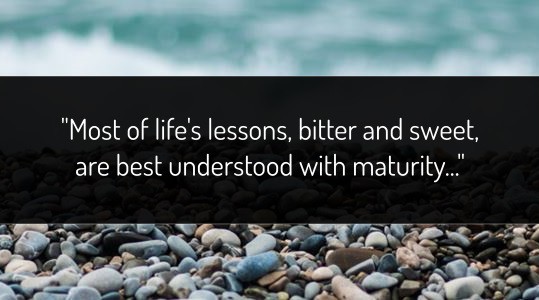
Savvy YouLearning with the Internet
Of all the things that make the internet valuable, the most important in my opinion, is that it is an effective learning tool.
The internet helps us tackle the complexity of knowledge in small, convenient steps. This is especially true of blog posts, articles, article series and tutorials. Each small step matters, but our long-term learning goals are far more important.
Here are some tips on how to use the internet to improve industry specific & professional knowledge.
Know What You’re After
The internet is full of information at almost every level of expertise and for every field of study. Knowing what you’re after is really important. Do you need answers to a particular question or do you want indepth understanding of a concept? Do you need to consult an online encyclopedia or would you rather read an academic article on the subject? I like to understand concepts thoroughly so I prefer the latter option. It’s up to you to decide what is most suitable for your situation.
Use Search Engines Wisely
Using the appropriate terms of reference, be they keywords, phrases or dates, can mean finding relevant articles in seconds. The first step before and at the onset of any internet search should be to identify the keywords used by industry professionals.
When possible, use a specialized search engine or search the contents of a particular website exclusively. This means sifting through a pool of relevant materials as opposed to sifting through an ocean of all materials.
Save Links, Collect PDFs
It’s important to hold yourself accountable for what you read and what you’ve learned. Saving or bookmarking links and articles helps you do this. It also makes it easier to accurately cite materials and quote sources. Furthermore, when you decide to re-read or refresh your memory, you won’t have to repeat your search.
Take Notes
In this situation, taking notes serves the same purpose as in formal learning. I think it’s even more important when using the internet. That’s because while the internet allows us to learn in small doses, (in no particular order) what we learn usually belongs to a larger body or group of knowledge.
Taking notes allows you to make connections between the little pieces of knowledge you acquire, so that they add-up to meaningful industry-specific knowledge.
This article was first published in Issue #03 of the HMJS Newsletter. Subscribe to download the latest issue.
Find the person behind the content
There’s so much information on the internet that it’s easy to forget the people who put them there! Remember that really nice article, that informative post, and that inspiring graphic? They were written and made by someone!
Getting to know the person behind the content can be very useful. Check article by-lines, read ‘about’ pages, and do some research. Knowledge is important and knowing the right people can lead you to the right piece of information at the right time!
Escape the location trap
Location specific information can be useful. However, this is not always the case. It may well be that the bulk of materials within your reach have been written by people whose experiences and day-to-day lives are quite different from yours.
Read them anyway! Learn what you can about best practices and methods. Gain insight on how to solve problems here in Nigeria by studying how things are done elsewhere. Take advantage of the information available to you and escape the location trap!
``Getting to know the person behind the content can be very useful. Check article by-lines, read ‘about’ pages, and do some research. Knowledge is important and knowing the right people can lead you to the right piece of information at the right time!``
Subscribe to websites and newsletters
‘Content is King’ in today’s world and almost everyone who runs a blog or website is eager to deliver extra content to people who appreciate it. Subscribing keeps you in the loop and gives you access to more content, often personalized, at no additional cost.
Use social and digital media wisely
Use social and digital media sites to learn and grow as a professional. Twitter, Facebook, LinkedIn, Google+, Youtube, Slideshare, Itunes, Soundcloud, etc, are used daily to research, collect, and distribute quality content. Find trusted sources, collect useful content, and conduct yourself in such a way that you can also become a trusted source.
Interact positively and constructively
Comment, evaluate, criticize, ask questions, and vote! Share your own knowledge and build relationships. The comments section is often a treasure trove because of reader contributions and multiple interactions with the author. Enhance the value of a forum by adding your 2 cents!
``Cross-reference and find multiple corroborating sources for any information you find. Bloggers often cross-link to older posts that provide greater context for the subject at hand. Use this and other tools to assess the authenticity and reputation of a website.``
Verify the authenticity of sources
This applies to websites, social media handles, quotes, and even Wikipedia entries. Cross-reference and find multiple corroborating sources for any information you find. Bloggers often cross-link to older posts that provide greater context for the subject at hand. Use this and other tools to assess the authenticity and reputation of a website.
No matter how tedious or pointless it seems, it is important to verify information. It is part of the due diligence we perform as users and content creators on the internet. Also, report spammer accounts and notify people when you think their accounts have been hacked. Do your due diligence when sourcing for information online.
``Respect authors and creators of content by citing and linking to their work when you quote, paraphrase, or summarize parts of it. Learners often become plagiarists by accident. That doesn’t excuse the act.``
Respect the source, Respect the web
Respect authors and creators of content by citing and linking to their work when you quote, paraphrase, or summarize parts of it. Learners often become plagiarists by accident. That doesn’t excuse the act.
Respect the internet and the positive culture of the web. The rules that govern the internet are in flux. Like many, I support liberal access beyond national borders as a matter of principle. While destructive events will not upend this principle, it will make it much harder to defend. Let’s keep the web open. Respect the web.
Pay for knowledge when you can
Pay for ebooks, podcasts, lecture notes or enroll in an online course when you can. Taking a series of accredited courses is one way to complete a certified program. Aim high. Get a certificate to prove you know what you know and are qualified to do what you do!
Conclusion
The internet makes learning easy, but knowledge is complicated. What the internet does is allow us to tackle the complexity of knowledge in small, convenient steps. Each small step matters, but your long-term learning goals are far more important.
Download the latest issue of the HMJS Newsletter. It’s a PDF Magazine which features 4 informative articles and many extras. The best part? It’s free!
-
10Mar
5 Life Lessons Shared
Life lessons are subtle yet powerful. And while they are true, they're certainly not true in exactly the same way for everyone. That life and its lessons can be unpredictable is the reason we should l...
-
24Jan
5 Trends Creative Entrepreneurs Will Enjoy in 2017
Hurrah!
We made it through 2016 in one piece. There were a few trends that suggest many of Nigeria's creative entrepreneurs made good progress in 2016. As we get back to the grind, there are 5 g...





Sorry, the comment form is closed at this time.